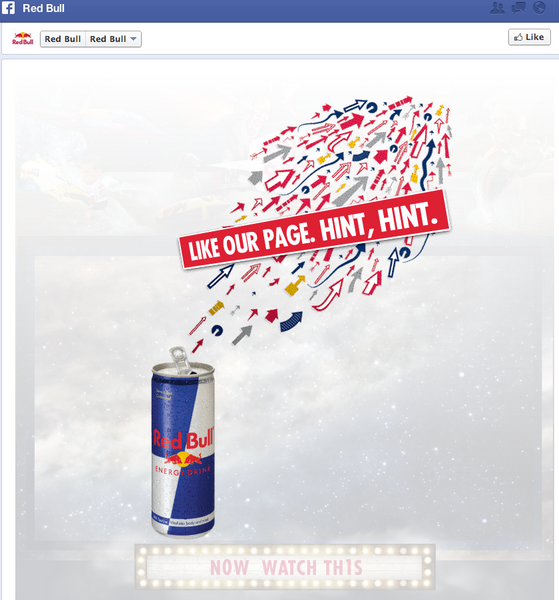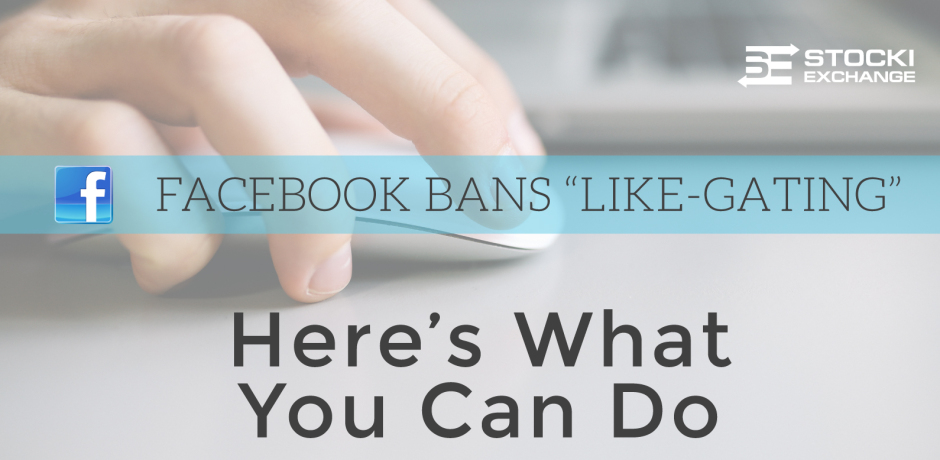Our Blog
Facebook has recently changed its policy on “like-gating” in their platform policies. Like-gating is the practice of requiring visitors to “Like” your page in order to participate in some kind of additional interaction such as a competition, giveaway, coupon, or reward.
The announcement pulled from the Facebook Developer blog, said, “You must not incentivize people to use social plugins or to like a Page. This includes offering rewards, or gating apps or app content based on whether or not a person has liked a Page. As of today, Facebook’s policy states “Effective November 5th, 2014, you may no longer incentivize people to like your app’s Page.

Example of like-gating, from Red Bull’s Facebook Page
So what does this mean for social marketers?
In recent months, anyone working in social marketing, specifically those managing Facebook pages for business, have realized a sharp decline in the organic reach of their posts. “Organic reach will be reduced to 1 percent or 2 percent”, according to an article in AdWeek. With organic reach all but diminished by Facebook’s strategy to drive more advertising revenue, what is a social marketer to do to reach their fans?
The quantity of likes a page has is vastly less important now than it used to be. Facebook’s algorithm now looks for different things when deciding which posts eventually make it to your fans’ or public news feeds. Facebook is all about INTERACTION. Your posts needs likes, comments, and shares. If not, it doesn’t matter how many likes your page has, because no one will see it.
Here are some ways to help your content be seen by more people by taking advantage of what Facebook’s algorithm is looking for from BufferSocial.
Do this (The Facebook algorithm loves):
- Posts with lots of comments
- Posts with lots of likes
- Post types that users seem to prefer more than others (e.g., photo, video, or status update)
- Posts that reference a trending topic
- Posts that receive a high volume of likes, comments, or shares in a short time
- Link posts
- Videos uploaded to Facebook that received a large number of views or extended viewing duration
- Posts that tag other pages within the text
- Posts that are liked or commented on by one’s friends
- Posts from pages that one interacts with often
- Post types that one interacts with often
- Posts from pages with complete profile information
- Posts from pages where the fan base overlaps with the fan base of other known high-quality pages
- Images and videos that have not previously appeared in the Open Graph
- Links that have not been posted before
Don’t do this (The algorithm is not too keen on):
- Clickbait
- Frequently circulated content and repeated posts
- Like-baiting
- Posts that include spammy links
- Text-only status updates from pages
- Posts that are frequently hidden or reported (a sign of low quality)
- Posts that contain the words “like, comment, or share”
- Posts with unusual engagement patters (a like-baiting signal)
- Posts that receive negative feedback categorizes as “meme content”
- Posts that are classified as memes by Facebook’s visual analysis of overlayed text on image
As you can see from the above list, there are some pretty simple ways to take advantage of what Facebook’s current algorithm is looking for and reacts best to by some strategic changes in how you create and distribute your content. You might be thinking, some of them are double edged swords. e.g., it suggests posts with lots of comments, posts with lots of likes get higher rankings…how are pages like yours supposed to get a lot of like and comments if no one is seeing the content? The answer: great content. Mainly driven by photos, video, and links that your fan base would be interested in.
Are you ready to update your brand and/or product photography, take a look at Allen-kent Photography. How about created a video piece that tells your brand story? Practical, a film production company has the answers. Interested in learning more about updating your marketing content or setting up a Facebook Advertising Campaign, contact me.
Despite the change in algorithm, Facebook still provides a great opportunity for brands to get their message out there and create a loyal and active following. However, it’s not as simple as just posting your weekly specials or latest promotion. I’d love to sit down with you and expand more on how Facebook and/or other forms of Social Marketing may be able to help your brand grow and stay up to day with the world of digital marketing. Let’s setup a meeting, it’s free.
One final question.
Have you started to use Facebook Advertising to promote your product or services? Did you find it effective and would you do it again? If you haven’t used Facebook advertising, what is your reason for not trying it?
Leave you answers in the comment section below and I’ll give you a reply, I promise!
BONUS TIP: For those of you who are only focused on how many “Likes” your page has. Please read this.
If your page has 50,000 likes, with today’s anticipated organic reach of 1-2%, you still capture a larger reach than a page with 2,000 likes, so likes do have an impact. But, there this is NOT a solid or effective strategy for Facebook marketing. You should be looking to build targeted likes, instead of just likes. Your page needs interaction. Building likes from fans who are actually interested in your products and/or services is better than a bunch of likes from people who don’t care and would not interact with your business/buy your product. This is why the practice of buying likes is a TERRIBLE IDEA. Likes, comments, and shares are the way to do it. Posting current, visually attractive and dynamic content is the best way to build a loyal social marketing following.

Comments ( 4 )
Leave A Comment
This site uses Akismet to reduce spam. Learn how your comment data is processed.
Subscribe Today


Very interesting and insightful information. In previous roles I was working with Facebook ads and campaigns and didn’t have any idea that there was an algorithm that determined what would reach our fans and other Facebook users. Definitely looking forward to applying this new insight and knowledge into my current role.
Thanks Anthony! Let me know it works out for you and your new position!
It is great to hear your perspective on this, Stocki Exchange, as I personally know several people who are scared of the new Facebook algorithms and what they will do to businesses. Your DO and DON’T list is spot-on. Nice post, John.
Content is key. if you’re struggling with what content to post, create a quick 5-10 question survey in Google Forms, get out your credit card, drop $30 and ask your followers. That $30 could be worth thousands in sales with the right questions and helpful answers.